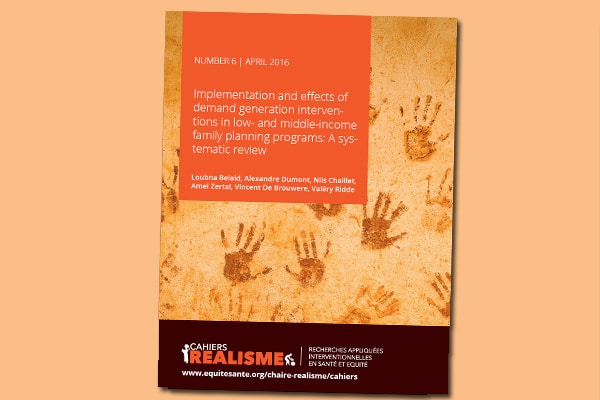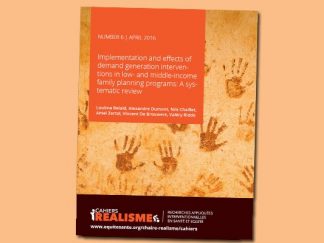Description
Cahier REALISME n°6: Implementation and effects of demand generation interventions in low- and middle-income family planning programs: A systematic review: Abstract
As part of its family planning strategy, the United Nations Population Fund (UNFPA) has commissioned a systematic review on family planning demand generation interventions in low- and middle-income countries (LMIC).
Objectives
The objectives of the review were: to synthesize evidence on the implementation process and costs of demand interventions, and to summarize evidence on their effectiveness in improving uptake of modern contraception methods. Demand generation interventions included in this review were community-based and facility-based interventions (social demand mobilization, counselling with community health workers or health providers, male motivators), financial mechanisms (voucher schemes, grant and loan funds, cash incentives) and mass media (radio).
Methods
A Cochrane systematic review was conducted. A meta-analysis and a narrative synthesis were also performed. A total of 20 papers meeting inclusion criteria were included in the review. However, few data were available on the implementation process and the influence of context on demand interventions.
Results
The little evidence on implementation showed the importance of the actors (community health workers and health providers) who delivered the interventions. They were able to positively or negatively influence the interventions. Involving family members during counselling and education activities and increasing the exposure of these activities enhanced the success of demand interventions. Demand interventions were positively associated with an increase of current use, ever use and intention to use modern contraceptive methods. These interventions decreased the unmet need for contraception and the rate of current pregnancies. Furthermore, demand interventions improved knowledge and attitudes towards family planning and improved discussion with partners/husbands on modern contraceptive methods. Finally, no evidence was available on costs and cost-effectiveness. More research is needed to strengthen the findings of this review and to build evidence on sustainability and scaling up demand interventions by measuring costs and cost-effectiveness.







Avis
Il n’y a pas encore d’avis.